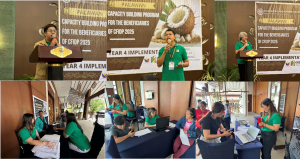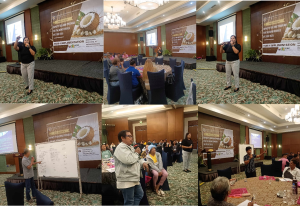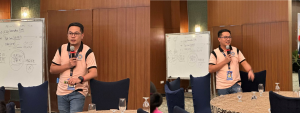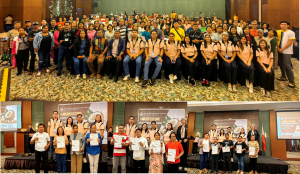The Coconut Farmers and Industry Development Plan (CFIDP) Year 4 activity held in Puerto Princesa City, Palawan, gathered coconut farmer leaders and cooperative officers for a week-long capacity-building program designed to strengthen both organizational development and cooperative governance. Conducted at the Princesa Garden Island Resort from June 2 to 7, 2025, the event was organized by the Cooperative Development Authority (CDA) as part of its ongoing implementation of the CFIDP.
Day 1: June 2, 2025 – Arrival and Registration
June 2 marked the start of the CFIDP Year 4 activity in Palawan. Throughout the day, participants from various parts of the province—including remote and island municipalities—arrived in Puerto Princesa City to join the scheduled activities. Given the geographical challenges in Palawan, travel time varied significantly, with some participants needing to leave their homes a day earlier to ensure timely arrival.
The organizing team from CDA MIMAROPA ensured a smooth registration process upon check-in at Princesa Garden Island Resort, providing welcome kits, program schedules, and accommodation briefings. Ms. Roxanne Gayzee B. Santiago, CDS II, Ms. Fatima A. Casaul, CDS II and Ms. Marian A. Concepcion, Palawan Program Coordinator and Acting Chief of Credit Surety Fund Section warmly welcomed each participant and offered assistance as needed, recognizing the effort it took for many to travel to the venue.
The rest of the day was dedicated to rest and orientation, allowing participants to recover from long journeys and prepare for the learning sessions ahead. This early convergence helped establish a relaxed yet purposeful atmosphere, laying the groundwork for a productive week of training and engagement.
Day 2: June 3, 2025 – Pre-Registration Seminar (PRS) and Organizational Registration
June 3 was a pivotal transition day in the CFIDP Year 4 activity. The morning was devoted to the Pre-Registration Seminar (PRS) as conducted by the CDS II of Cooperative Project Development and Assistance Section, Mr. Mark M. Manrique, attended by 6 Coconut Farmers’ Associations, each with 15 members, totaling 90 farmer-representatives. The seminar introduced these unregistered associations to the process of becoming formal cooperatives under the CDA, emphasizing the legal, financial, and organizational benefits of registration.
Simultaneously, CDA personnel headed by the Registration Chief Ms. Helen S. Servañez, facilitated on-site registration processing, providing technical assistance to help associations begin or complete their documentary requirements. The session was both informative and empowering, giving grassroots leaders a clearer understanding of how to institutionalize their organizations under the CFIDP framework.
Following the seminar, PRS participants departed for their respective hometowns. For many farmers, the short yet impactful engagement marked the start of a longer journey toward cooperative formalization.
As the day progressed, a new group of participants began to arrive—this time, representatives from 25 Coconut Farmers’ Cooperatives. Each cooperative sent 5 officers including 8 partners from different agencies and Cooperative Development Officers to attend the upcoming training sessions on Basic Accounting and Parliamentary Procedure scheduled from June 4 to 6. The arrival of this second wave of participants marked a smooth logistical transition managed by the CDA team, ensuring continuous flow in the week’s program.

Days 3–4: June 4–5, 2025 – Basic Accounting for Non-Accountants
From June 4 to 5, 133 participants from 25 Coconut Farmers’ Cooperatives and Partners underwent the Basic Accounting for Non-Accountants training facilitated by CDA MIMAROPA’s Cooperative Research, Information, and Training Section Chief Ms. Eva Loraine R. Cataje. The course aimed to equip cooperative officers—particularly treasurers, bookkeepers, and board members—with essential financial literacy and operational tools for sound cooperative management.
The sessions began with an overview of basic accounting concepts and procedures, clarifying the distinct roles of treasurers, bookkeepers, accountants, and the audit committee within a cooperative’s financial system. Participants were introduced to the ethical responsibilities of financial officers, including integrity, objectivity, independence, and due care—emphasizing accountability to members, creditors, and government stakeholders.
Core Learning Topics Included:
- Accounting Objectives and Functions: Introduction to the purpose of accounting systems in cooperatives: recording, classifying, summarizing, and reporting financial transactions.
- Bookkeeping vs. Accounting: Participants learned that bookkeeping involves transaction recording, while accounting encompasses the full cycle—designing systems, preparing financial reports, and supporting decision-making.
- Minimum Internal Control Standards: Emphasis was placed on internal controls such as segregation of duties, dual control, system of authorization, and manual of operations to ensure proper handling of cooperative assets.
- Accounting Equation & Transactions: Explanation of the accounting equation:
Assets = Liabilities + Capital and
Revenues – Expenses = Net Surplus/Loss
Participants applied these concepts through sample entries and hands-on journalizing exercises.
- The Accounting Cycle: An in-depth walkthrough of the steps from daily journal entries to the preparation of a Trial Balance, and ultimately the Financial Statements.
- Financial Reports of Cooperatives: Training covered the Statement of Financial Condition (Balance Sheet), Statement of Operation (Income Statement), Statement of Cash Flows, and Statement of Changes in Equity. Participants were taught how to interpret and use these reports in monitoring the cooperative’s performance.
- Hands-on Exercises: Using the fictional “Golden Smile MPC” as a case study, participants journalized sample transactions, posted to ledgers, prepared a trial balance, and developed complete financial statements.
- Chart of Accounts: The Revised Standard Chart of Accounts (based on MC 2022-24) was introduced to guide participants on standardized bookkeeping practices required by the CDA.
Through active learning, warm-up activities, and group exercises, participants not only understood theoretical concepts but also developed practical accounting skills applicable to their daily roles. The interactive approach helped demystify financial management, and many participants shared during feedback sessions that the training filled a long-standing knowledge gap.

Days 4–5: June 5–6, 2025 – Parliamentary Procedure and Minutes Writing
On June 5–6, the same 25 cooperatives including partners continued their training, this time focusing on Parliamentary Procedure and Minutes Writing. The workshop provided in-depth knowledge on how to conduct effective meetings and maintain proper documentation.
Participants engaged in:
• Role-plays of general assemblies and board meetings
• Motion-making and voting simulations
• Writing exercises for accurate and legally compliant meeting minutes
The training fostered a deeper appreciation for democratic governance and transparency in cooperative operations. The use of practical scenarios and real-time feedback enabled cooperative leaders to strengthen both their procedural knowledge and recording accuracy.

The final day of participant engagement featured a meaningful closing program that celebrated the week’s achievements and the shared learning journey. Representatives from the 25 participating cooperatives and partners were invited to speak about their key takeaways, many highlighting how the training clarified their financial responsibilities, improved their governance practices, and deepened their understanding of cooperative management.

Day 6: June 7, 2025 – Team Assessment and Internal Evaluation
The final day of the CFIDP Year 4 activity served a dual purpose.
In the morning, the 133 participants from 25 Coconut Farmers’ Cooperatives, who had completed the three-day training on Basic Accounting and Parliamentary Procedure, began departing from Princesa Garden Island Resort. Warm farewells, photo opportunities, and final expressions of appreciation marked the closing moments of their stay. For many, the event was not just a training opportunity—it was a meaningful experience of fellowship, learning, and cooperative solidarity.
Meanwhile, the CDA MIMAROPA team (8) remained on-site to conduct a thorough internal assessment and evaluation of the week-long activity. The debriefing session covered:
- The effectiveness of the PRS and registration process for farmers’ associations
- The quality and relevance of training delivery for cooperatives
- Participant engagement, logistical coordination, and materials distribution
- Lessons learned and recommendations for future CFIDP activities
The internal evaluation confirmed that the objectives of the event were met, and valuable insights were gathered to improve implementation in other areas of MIMAROPA and the rest of the country.
The CFIDP Year 4 Activity in Puerto Princesa, Palawan was not just a week of training, but a comprehensive capacity-building effort that bridged technical education, grassroots empowerment, and institutional support. With over 170 farmers from 10 associations and 141 cooperative officers from 25 cooperatives engaged, the initiative made tangible progress in strengthening the foundation of coconut-based organizations in the region.
The combination of knowledge transfer, legal formalization support, and inclusive participation ensures that these organizations are better equipped to carry forward the mission of inclusive, transparent, and sustainable cooperative development.






